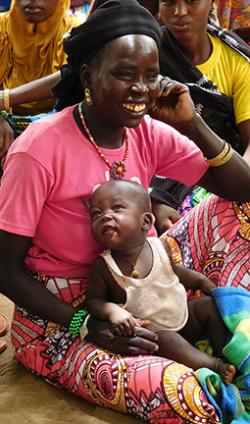Earth Day 2019
To mark Earth Day, we asked Helen Keller International’s Senior Nutrition Advisor, Jennifer Nielsen, to answer questions about the impact of climate change on the vulnerable communities we serve around the world, and to outline actions we can prioritize in response to the climate crisis.
Q: How does climate change threaten the health and nutrition of the populations Helen Keller International serves?
A: I use the term “climate crisis” to convey that at our current unsustainable level of fossil fuel usage, we are truly in an emergency. The burning of those fuels and subsequent rise in global temperatures is disrupting the normal patterns of seasons, causing rain to come too early or late, too little or all at once. In countries like Niger, where even in the best of times people go hungry many months of the year, crops are now failing altogether more frequently, and floods are wiping out people’s livestock holdings — their life savings. In Nepal we are seeing more landslides in the near term, and the melting snow in the Himalayas will mean dire water shortages in the long term. Hungry people will be even hungrier.
Q: Who is most at risk?
A: We are all at risk! People who live in tropical climates will be more affected than others, because temperatures there are rising most rapidly. Families living in poverty with no safety net will suffer the most. When they have a bad harvest and run out of food, they won’t have the money to buy it elsewhere. They will have no choice but to cut down on the number of meals they eat each day. You can imagine how children would especially suffer, not just from hunger pangs but from not having enough nutrients for their growing bodies to function.
Q: Could you provide one example of a population with whom we work that has been severely impacted by climate change?

Helen Keller International works in partnership with communities in Niger to prevent malnutrition and improve health.
A: Niger’s eastern region of Diffa is one of the poorest places in the world. It is in the Sahel desert, so rains come only once a year and there is only one major harvest. Most of the year there is not enough to eat. On top of that, the population has been hosting refugees fleeing violence caused by civil conflict in neighboring Nigeria.
Even though they have so little, their culture values hospitality, and so they share what they have. As a result of climate change, the rains lately come in torrential downpours, washing away painstakingly planted seeds and sometimes even homes. Last year, floods destroyed more than 1,000 acres of rice and 33,000 livestock and wiped out thousands of homes. It is unimaginable how suffering piles up on top of suffering.
Many of these communities in the desert climate of Diffa are pastoralists who depend on raising livestock to make a living—traveling seasonally with their herds of cattle or camels in search of water and pasture. They are very resourceful and well accustomed to living with little rainfall in arid climates—but the cycles of drought that used to occur every 10 years or so are now occurring almost every year. Even though these communities have very strong coping mechanisms and are used to living on very little, extreme climate shocks are threatening their ability to survive.
Q: Helen Keller International is not a conservation or environmental organization per se. Why do you feel that climate change needs to be an urgent priority for all global development organizations?
A: We are striving to rid the world of malnutrition. At its most elemental, this means that everyone receives the essential nutrients the body needs to support good health and development, including enough iron for physical strength and mental acuity, and enough vitamin A and zinc to fight off illness rather than die of it. The climate crisis is making it harder to reach these goals and may begin reversing the progress we’ve made. It will increase conflict over increasingly scarce resources like water and fertile land, and it will drive more people to leave homes where they can no longer survive.
I think we need to work on two fronts. We need to help vulnerable communities cope with more frequent disasters and crop losses, with programs like early warning systems to help anticipate and plan for these disasters, more diverse and climate-smart food production, and crop insurance. We also need to educate people in better-off communities like our own about how we can reduce our contribution to the problem. For example, Americans eat more than six times as much beef as is healthy for their own hearts and for the planet. If everyone ate one less serving of meat per week, or did not eat meat at all at least one day a week, we could make a difference.
Q: How can Helen Keller International integrate efforts to help communities build resilience to climate change into all its programs?
A: Our homestead food production programs can collaborate with agricultural research organizations to make sure we offer people the most resilient seed varieties. (We are already doing this in several countries where we work.) We can teach techniques that reduce the amount of water needed to keep crops alive.
We can partner with other NGOs with expertise in early warning technologies, capacity-building, and alternative income-generating opportunities to complement Helen Keller International’s expertise. We have some exciting collaborations in the works, and I look forward to seeing what the next few years will bring.









